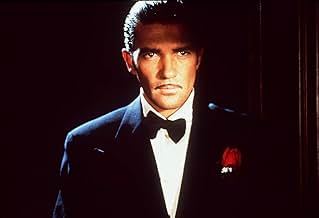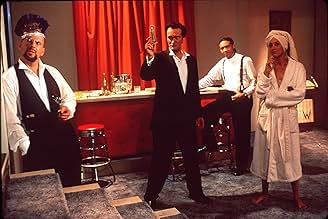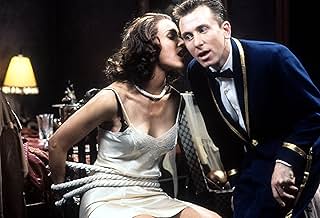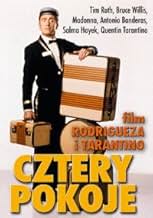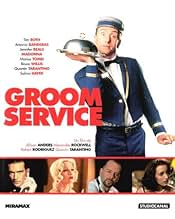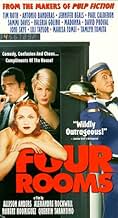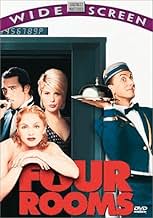Quatro histórias entrelaçadas que acontecem em um hotel que se desvanece na véspera do Ano Novo.Quatro histórias entrelaçadas que acontecem em um hotel que se desvanece na véspera do Ano Novo.Quatro histórias entrelaçadas que acontecem em um hotel que se desvanece na véspera do Ano Novo.
- Prêmios
- 1 vitória e 1 indicação no total
Amanda De Cadenet
- Diana (segment "The Missing Ingredient")
- (as Amanda deCadenet)
Patricia Vonne
- Corpse (segment "The Misbehavers")
- (as Patricia Vonne Rodriguez)
Avaliações em destaque
"Four Rooms" is far more entertaining than you would expect from its generally negative reviews. Which is not to say that any of it is a masterpiece but if you enjoyed "Love American Style" on television and are not put off by a raunchy take on that anthology concept you should make an effort to view this film. Each story is taking place in a different room of a hotel the same night. It was made between the time Tarantino made "Pulp Fiction" and worked on "Dusk Till Dawn" with Rodriquez. Many in the large cast are Tarantino and Rodriquez regulars. Here are a few of the reasons to watch each of the four stories:
"The Missing Ingredient" - Madona has simply never looked better and her "come get me" dress will burn your eyeballs. Alicia Witt plays her stock alienated teen and delivers sarcasm as only she can.
"The Wrong Man" – Alexander Rockwell directed this segment shortly after directing "In the Soup" so he already knew how to get the most out of Jennifer Beals. Her diatribe about Ted's sex organ is a cinema classic.
"The Misbehavers" – Rodriquez directs his favorite actor Antonio Banderas in something that is a throwback to classic Laurel and Hardy. Not only do his two kids misbehave when left alone in their hotel room, but their misbehavior is so comprehensive that the closing shot reveals a room of total anarchy. It is wonderful slapstick on a huge scale, with comic timing worthy of the Laural and Hardy and the Marx Brothers.
"The Man From Hollywood" – This has the best script with Tarantino reserving the best stuff for his own character. He even reprises the "tasty beverage" line from "Pulp Fiction. Beals has already found her way to this room by the time bellboy Roth arrives and she delivers more good lines. I was impressed that Tarantino built up his suspense "before" the contest began and then did not try to extend the suspense but ended things on the first attempt.
The best bit in the whole film might be Roth's phone call to his boss. Marisa Tomei answers the phone in a room full of comatose post-New Years Eve partygoers. She then does a version of her "My Cousin Vinnie" expert witness routine, this time concerning types of handguns. In the foreground the entire time are the only other conscious (but totally stoned) inhabitants of the room. They are playing against each other in a video game. One just stares in stunned fascination at the screen, holding the controller but not using it as the other player maniacally manipulates his controller throughout the entire phone conversation.
"The Missing Ingredient" - Madona has simply never looked better and her "come get me" dress will burn your eyeballs. Alicia Witt plays her stock alienated teen and delivers sarcasm as only she can.
"The Wrong Man" – Alexander Rockwell directed this segment shortly after directing "In the Soup" so he already knew how to get the most out of Jennifer Beals. Her diatribe about Ted's sex organ is a cinema classic.
"The Misbehavers" – Rodriquez directs his favorite actor Antonio Banderas in something that is a throwback to classic Laurel and Hardy. Not only do his two kids misbehave when left alone in their hotel room, but their misbehavior is so comprehensive that the closing shot reveals a room of total anarchy. It is wonderful slapstick on a huge scale, with comic timing worthy of the Laural and Hardy and the Marx Brothers.
"The Man From Hollywood" – This has the best script with Tarantino reserving the best stuff for his own character. He even reprises the "tasty beverage" line from "Pulp Fiction. Beals has already found her way to this room by the time bellboy Roth arrives and she delivers more good lines. I was impressed that Tarantino built up his suspense "before" the contest began and then did not try to extend the suspense but ended things on the first attempt.
The best bit in the whole film might be Roth's phone call to his boss. Marisa Tomei answers the phone in a room full of comatose post-New Years Eve partygoers. She then does a version of her "My Cousin Vinnie" expert witness routine, this time concerning types of handguns. In the foreground the entire time are the only other conscious (but totally stoned) inhabitants of the room. They are playing against each other in a video game. One just stares in stunned fascination at the screen, holding the controller but not using it as the other player maniacally manipulates his controller throughout the entire phone conversation.
Four Rooms was concocted like one of those many, many collaborative efforts from directors in the 60's and 70's (i.e. The Witches, Ro.Go.PaG, Boccaccio '70, etc), except this would revolve around a bell-hop on New Years Eve. It disqualifies itself as being any kind of masterpiece or classic in independent film-making, and sometimes the filmmakers (Alison Anders, Robert Rodriguez, and Alexandre Rockwell, and Quentin Tarantino, the last two also serving as executive producer) look like they're relishing too much in their (limited) clout and exuberance to concentrate. As was with many others who viewed the film, I found that the first two segments were the lesser ones, and the last two were the best ones. It all comes down, in this case, to which two were funnier. So, let's break each one down:
Allison Anders' film is a quirky, quasi-lesbian take on a coven of witches, featuring the likes of Madonna and Lily Taylor, are the first to shake up (perhaps for the better in this one) Ted the bell-hop. Ted, by the way, is played with a continuous, nervous-type of fervor that goes from being innocuous, to annoying, and then acceptable again. It's also interesting to see how his character goes through different motions when under each director (for example, in Rodriguez's film he's more of a cartoon-type of character, and in Tarantino's film he hearkens slightly to his previous collaborations with the director, quieter, on edge in a particular way). Some of the laughs are surrounded by a kind of attitude put forth by the director that seems a little off. Maybe I'm the wrong audience for it, though- the women in the audience may appreciate it, or rather amused by it, more than I. I give it a B-
Alexandre Rockwell's The Wrong Man is my least favorite of the bunch, as Ted gets stuck with a couple of crazed fetishists (David Proval and Jennifer Beals). The problem here lies with two things- the fact that the comedic timing/chemistry is a little iffy/off with the three actors, and that the writing doesn't come off like it's naturally funny. When Beals' character Angela runs off about Ted's private parts, this could be funny, but it's more 'ho-ho' than 'ha-ha' to me. Some of the tension from Roth brings some laughs, but not enough to compensate the uncomfortable atmosphere around the whole segment. I give it a C-
The third segment, The Misbehaviors, displays how clever and quick Rodriguez can be with physical comedy (slapstick) as well as in getting laughs from kids (as he did here and there in his Spy Kids movies). It is also a boost that the whole segment comes off as though it's like a live-action Looney Tunes short- it's so ridiculous that in some scenes I burst out laughing (i.e. Ted's reaction to the corpse). The set-up with the parents was also amusing in how Banderas and Tamlyn Tomita act towards the kids. Then the pay-off knocks it out of the park. Grade: A
Then we come to the closure, featuring the indie wunderkind at the time, Tarantino, as he takes on two sources of inspiration- Rohald Dahl's "Man from the South" short story, later translated through Alfred Hitchcock's television show. It's a smart, hip little piece of Hollywood satire from Tarantino, as he himself plays an overly obnoxious Hollywood filmmaker, with two guys by his side (Paul Calderon and Bruce Willis), as they take a gamble right after the stroke of midnight. It took me a couple of time to watch this to really get into it, but when I did it was even more promising. The camera-work in the scene (via 'Dogs' and 'Pulp' cinematographer Andrzej Sekula) is deliberately paced, and it's perfectly leisurely for the pace of the last segment. That much, if not all, of the dialog is funny it's because of the skill and chemistry between the four of them. Plus, a little prologue with Marisa Tomei and Kathy Griffin gives the indication of what insanity is in store. Grade- A.
So, is this film a success? For it's time, I'm not sure. With the power of four million off the success of each director's previous efforts (Tarantino with 'Dogs', Rodriguez with El Mariachi, Anders with Gas, Food, and Lodging, and Rockwell with In the Soup, all from the 92 Sundance place), they did whatever they wanted, and it's not the success it could've been. On the other hand, when one looks at the films in perspective, it could've been a lot worse, and it wasn't. At the least, it works as one of the quintessential party movies for fans of the 90's "new-wave" crop.
Allison Anders' film is a quirky, quasi-lesbian take on a coven of witches, featuring the likes of Madonna and Lily Taylor, are the first to shake up (perhaps for the better in this one) Ted the bell-hop. Ted, by the way, is played with a continuous, nervous-type of fervor that goes from being innocuous, to annoying, and then acceptable again. It's also interesting to see how his character goes through different motions when under each director (for example, in Rodriguez's film he's more of a cartoon-type of character, and in Tarantino's film he hearkens slightly to his previous collaborations with the director, quieter, on edge in a particular way). Some of the laughs are surrounded by a kind of attitude put forth by the director that seems a little off. Maybe I'm the wrong audience for it, though- the women in the audience may appreciate it, or rather amused by it, more than I. I give it a B-
Alexandre Rockwell's The Wrong Man is my least favorite of the bunch, as Ted gets stuck with a couple of crazed fetishists (David Proval and Jennifer Beals). The problem here lies with two things- the fact that the comedic timing/chemistry is a little iffy/off with the three actors, and that the writing doesn't come off like it's naturally funny. When Beals' character Angela runs off about Ted's private parts, this could be funny, but it's more 'ho-ho' than 'ha-ha' to me. Some of the tension from Roth brings some laughs, but not enough to compensate the uncomfortable atmosphere around the whole segment. I give it a C-
The third segment, The Misbehaviors, displays how clever and quick Rodriguez can be with physical comedy (slapstick) as well as in getting laughs from kids (as he did here and there in his Spy Kids movies). It is also a boost that the whole segment comes off as though it's like a live-action Looney Tunes short- it's so ridiculous that in some scenes I burst out laughing (i.e. Ted's reaction to the corpse). The set-up with the parents was also amusing in how Banderas and Tamlyn Tomita act towards the kids. Then the pay-off knocks it out of the park. Grade: A
Then we come to the closure, featuring the indie wunderkind at the time, Tarantino, as he takes on two sources of inspiration- Rohald Dahl's "Man from the South" short story, later translated through Alfred Hitchcock's television show. It's a smart, hip little piece of Hollywood satire from Tarantino, as he himself plays an overly obnoxious Hollywood filmmaker, with two guys by his side (Paul Calderon and Bruce Willis), as they take a gamble right after the stroke of midnight. It took me a couple of time to watch this to really get into it, but when I did it was even more promising. The camera-work in the scene (via 'Dogs' and 'Pulp' cinematographer Andrzej Sekula) is deliberately paced, and it's perfectly leisurely for the pace of the last segment. That much, if not all, of the dialog is funny it's because of the skill and chemistry between the four of them. Plus, a little prologue with Marisa Tomei and Kathy Griffin gives the indication of what insanity is in store. Grade- A.
So, is this film a success? For it's time, I'm not sure. With the power of four million off the success of each director's previous efforts (Tarantino with 'Dogs', Rodriguez with El Mariachi, Anders with Gas, Food, and Lodging, and Rockwell with In the Soup, all from the 92 Sundance place), they did whatever they wanted, and it's not the success it could've been. On the other hand, when one looks at the films in perspective, it could've been a lot worse, and it wasn't. At the least, it works as one of the quintessential party movies for fans of the 90's "new-wave" crop.
8ck-7
I really don't understand why this movie got such bad reviews! Overall, this is a creative and refreshing movie. It is not Pulp Fiction but it is still a good performance. Tim Roth, especially, is the best thing in the film. Out of the four I like Robert Rodguize's misbehavior the best. The missing ingredient was indeed a bit cheesy but the rest are still above average performance. If you are interested in this movie but discouraged by the movie critics, I ensure you that you won't regret seeing it.
I've decided to review each segment separately, this may take a while so if you can't be bothered please feel free to move on, but I'm trying to save you time and money.
Segment#1: The Missing Ingredient
Aka this biggest piece of sh*t I've ever had the (dis)pleasure of viewing. If you want to see how not to make a short story then watch this segment, it's badly timed, badly judged, badly acted - just plain bad. I gave up watching the film on the first attempt because this was just awful, why the hell did they cast Madonna, avoid at all costs. (1/10)
Segment#2: The Wrong Man
Things don't get much better in Rockwell's piece, the cinematography and production design are nice but besides that the entire thing is just dull, the plot is just too deeply structured to work on this small running time. More threatening than comedic; let's move on. (3/10)
Segment#3: The Misbehavers
Believe what others have written, this IS the reason to watch this movie, brilliant non-stop hilarity as Tim Roth's Ted the Bellboy is left in charge of two brat-ish troublesome kids. Rodriguez has a great handle on the mixture of slapstick farce and black comedy that's very satisfying. Things can only get better... (9/10)
Segment#4: The Man From Hollywood ...Except they don't. Tarantino's segment is good enough, lots of experiments with primary colours and long stedicam tracking shots, but you can't help thinking the film is just pandering to Tarantino's ego (he play's the biggest star in Hollywood). But the ending works well and the tension built is fantastic. (8/10)
To finish, Four Rooms would have been better if they had scraped the first two monstrosities (Anders and Rockwell where riding the coattails of Rodriguez and Tarantino anyway and have no where near as much talent) and kept the film as an hour-long TV special. If you must watch it, fast forward the first two segments, you'll save a lot of time and effort...
Overall rating 4/10
Segment#1: The Missing Ingredient
Aka this biggest piece of sh*t I've ever had the (dis)pleasure of viewing. If you want to see how not to make a short story then watch this segment, it's badly timed, badly judged, badly acted - just plain bad. I gave up watching the film on the first attempt because this was just awful, why the hell did they cast Madonna, avoid at all costs. (1/10)
Segment#2: The Wrong Man
Things don't get much better in Rockwell's piece, the cinematography and production design are nice but besides that the entire thing is just dull, the plot is just too deeply structured to work on this small running time. More threatening than comedic; let's move on. (3/10)
Segment#3: The Misbehavers
Believe what others have written, this IS the reason to watch this movie, brilliant non-stop hilarity as Tim Roth's Ted the Bellboy is left in charge of two brat-ish troublesome kids. Rodriguez has a great handle on the mixture of slapstick farce and black comedy that's very satisfying. Things can only get better... (9/10)
Segment#4: The Man From Hollywood ...Except they don't. Tarantino's segment is good enough, lots of experiments with primary colours and long stedicam tracking shots, but you can't help thinking the film is just pandering to Tarantino's ego (he play's the biggest star in Hollywood). But the ending works well and the tension built is fantastic. (8/10)
To finish, Four Rooms would have been better if they had scraped the first two monstrosities (Anders and Rockwell where riding the coattails of Rodriguez and Tarantino anyway and have no where near as much talent) and kept the film as an hour-long TV special. If you must watch it, fast forward the first two segments, you'll save a lot of time and effort...
Overall rating 4/10
Four Rooms, the 4 part directed, 4 part written mix-matched movie turns out to be an awesome combination. With Robert Rodriguez and Quentin Tarantino working on this film, you seem to expect a trigger-happy film festival with plenty of bombs and explosives to spare. But what the final product turns out to be is a laugh-out-loud comedy which follows a bellhop's mishaps one night as he scrambles to keep his hotel in order. Tim Roth is always a great performer and in this movie there is no difference. Kudos indeed.
Você sabia?
- CuriosidadesThe reason Bruce Willis is not credited is because he violated SAG rules for acting in this film for no money. He appeared for fun and as a favor to Quentin Tarantino, and acting for free violated SAG rules. SAG agreed not to sue Willis if his name was not included in the credits.
- Erros de gravaçãoWhen Ted leaves the room with the married couple, his hair is visibly shorter than when he was in the room.
- Citações
Angela: Whether you like it or not, you are in the middle of a situation here you cannot just wish your way out of.
Ted the Bellhop: But I've never met you people before! You're complete strangers!
Angela: Everybody starts out as strangers, Ted. It's where we end up that counts.
- Cenas durante ou pós-créditosBruce Willis does not apear in the credits but his hairstylist does
- Versões alternativasAs indicated in the Technical Specifications link for this page on IMDB, there are two different versions of this film: "1 hr 38 min (98 min)" and "1 hr 50 min (110 min) (workprint)". Information on the workprint is as follows: "[The] second version is in English but it is overdubbed with Russian. This makes it almost impossible to work out what is extra as the Russian is much louder than the English and therefore the English cannot be heard for the majority of the movie. I have done some research and have been told that it is impossible to remove the Russian audio. The disc also contains a deleted scene from the Spanish DVD that is an alternate take, not used in either the DVD Version or the Workprint."
- ConexõesFeatured in Cinemania: Ypalliloi en drasei! (2009)
- Trilhas sonorasSentimental Journey
Written by Bud Green, Les Brown, Ben Homer
Performed by Juan García Esquivel (as Esquivel)
Courtesy of The RCA Records label of BMG Music
Principais escolhas
Faça login para avaliar e ver a lista de recomendações personalizadas
- How long is Four Rooms?Fornecido pela Alexa
Detalhes
- Data de lançamento
- País de origem
- Central de atendimento oficial
- Idioma
- Também conhecido como
- Grande Hotel: Uma Comédia 5 Estrelas
- Locações de filme
- Empresas de produção
- Consulte mais créditos da empresa na IMDbPro
Bilheteria
- Orçamento
- US$ 4.000.000 (estimativa)
- Faturamento bruto nos EUA e Canadá
- US$ 4.257.354
- Fim de semana de estreia nos EUA e Canadá
- US$ 427.733
- 25 de dez. de 1995
- Faturamento bruto mundial
- US$ 4.257.354
- Tempo de duração
- 1 h 38 min(98 min)
- Cor
- Mixagem de som
- Proporção
- 1.85 : 1
Contribua para esta página
Sugerir uma alteração ou adicionar conteúdo ausente



